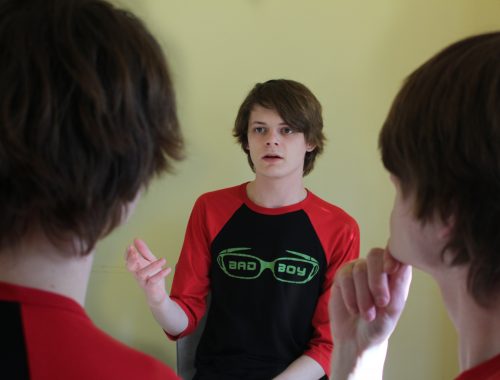The Dreaded Simulated Interview
Job Interviews. We all love them, right? I mean what is there not to love about undergoing interrogation in front of a panel of industry professionals that ask you dreaded questions like ‘Tell us about yourself.’
Job Interviews are undoubtedly one of the most dreaded experiences that we as a human race must face at some point in our lives. However, it is an experience many of us must undergo in the hopes that we get our dream job. As a part of my work-based learning module we had the opportunity to take part in a simulated interview, giving me the opportunity to practice my interview skills and giving me insight into what to expect in an interview to ultimately prepare me for applying for post-graduate jobs in the industry when I graduate. This blog reflects my experience with my simulated interview using the Gibbs reflective cycle, from how I prepared for the interview to the day of the actual interview and my feelings afterwards.
[1]

Preparing For the Dreaded Day
The job specification I chose for my interview was for the role of a production assistant at Perspective Pictures London. The job description outlined an array of skills and responsibilities the ideal candidate would have for the job, so I knew I had to prepare to match these skills and expectations in my answers during the interview. Therefore, I started to prepare my answers to prove my I would be the ideal candidate for the job.
My findings of statistics that state that ‘lack of confidence during the interview is why 40% of interviewers don’t take candidates past the first stage,’ [2] made me realise I had to be well prepared for the interview in order to be completely confident in myself and in my answers during the interview.
Eye-opening statistics such as the one above proved to me the importance of preparing for an interview in advance, and therefore I began to from possible interview answers I could use on the day by consulting my job specification to figure out what the employer was looking for and by applying the STAR technique to structure my answers in the most effective way possible. This technique is recommended by multiple notable organisations such as Queen’s University Belfast, LinkedIn and Indeed in order to attack competency based questions during an interview in the most effective manner. By employing this technique, I was able to prepare and form answers with a structure that allowed me to communicate solid examples proving my competency and skills in a judicious and confident way and that I possess the skills and experience for the job.
[3]

After preparing an extended list of well-formed answers I could use during the simulated interview, I realised I was out of practice in how I would orally deliver my answers during the interview. In order to succeed in an interview, it is not enough to simply list off reasons why you are suitable for a job, but you must communicate them in a confident and natural yet engaging manner. As I found in my research for what makes a successful interview, I found that ‘40% of recruiters state the candidate’s voice quality and a lack of smile might be reasons for rejection. Additionally, 65% of interviewers reject candidates who fail to make eye contact.’ [2]
In order to make sure I was prepared in my delivery I decided to set up a mock interview with my housemate and got her to act as the interviewer, providing her with possible interview questions. This way, I was able to practice answering the interview questions orally in an interview setting, and was able to ensure I was keeping eye contact, smiling and had a good voice quality.
The Arrival of the Dreaded Day
Finally, it was interview day. Anxiety started to creep up on me as I stood outside the interview room awaiting to be called into. My brain felt scrambled as I looked down at my notes, almost unable to take in what I had prepared. I started to panic and overthink. What if all the questions they asked me were the complete opposite of what I prepared for? What if I took a complete mind blank and my brain forgot how to speak?
I was finally called into the room. I took a deep breath and reassured myself that I had prepared myself well enough for things to not go completely haywire. When I sat down, I made sure on first impressions I seemed confident, maintaining eye contact and a smile whilst greeting the interviewers.
The interview ended up going surprisingly well. I managed to answer the majority of the questions asked well and was able to demonstrate my skills with using examples to demonstrate my experience, and well as including examples from my part-time job as a waitress, which I was able to relate the skills I learned on that job to the one I was applying for. From reading back my feedback from my peers, I learned that I need to work on my delivery, as I think my nervousness slightly got the better of me and I took a couple mind blanks and slightly panicked when I couldn’t think of an answer to certain questions.
A Valuable Learning Experience
All in all, although the interview didn’t go perfectly, it was a valuable learning experience. I was able to figure out what my strengths and weaknesses are when it comes to being in an interview setting, and it was a great opportunity to have a mock interview as a part of my work-based learning module. As I continue to take interviews as I move into the real world of work, I will now be able to apply what I have learned from this experience, and it is now a goal of mine to improve my presentation skills and build my confidence to that of a passionate candidate to set me apart from other skilled candidates.
References
[1] Crowes Associates Ltd. ‘Gibbs Reflective Cycle,’ Available at: https://www.crowe-associates.co.uk/coaching-tools/gibbs-reflective-cycle/ (Accessed: 17th February 2022)
[2] What To Become ’27 Interview Statistics: All You Need To Know In 2021’ (2021), Available at: https://whattobecome.com/blog/interview-statistics/ (Accessed: 18th February 2022)
[3] The Balance Careers ‘How To Use the STAR Interview Response Method’ (2021), Available at: https://www.thebalancecareers.com/what-is-the-star-interview-response-technique-2061629 (Accessed: 18th February 2022)
The Pressure Cooker
You May Also Like

Shocker, Tom also sucks at interviews!
18 February 2022
Simulated Interviews: A Pointless Exercise?
14 February 2022
